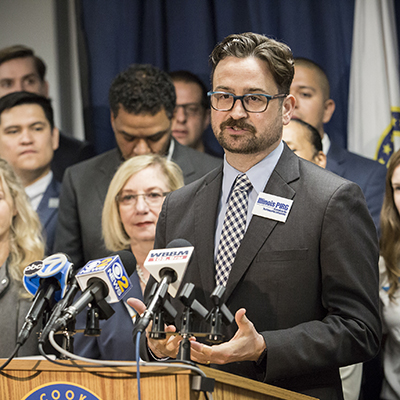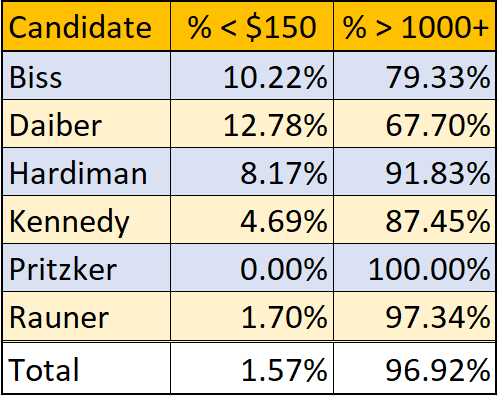
Go Big or Go Home
To compete in the race for Illinois Governor, candidates are raising the vast majority - 97% - of their campaign funds this year from donors giving $1,000 or more.
Illinois is on track to hold the most expensive gubernatorial election in United States history. Two candidates, JB Pritzker and Bruce Rauner, have put tens of millions of dollars of personal wealth into their campaigns, and Rauner has received multi-million contributions from other super-wealthy donors.
This level of campaign cash is mind-boggling, but the sheer volume of big money pouring into our election is not the only story.
The reality that candidates increasingly must raise massive amounts of money from an incredibly small number of elite donors –or have significant personal wealth to fund their own campaign– to be able to compete at all. Just last week, Ameya Pawar ended his candidacy, saying of his campaign: “we simply don’t have the money to meaningfully scale this campaign statewide.”
So far this year, 97 percent of money raised by candidates still active in the race has come from donors giving $1,000 or more, while less than two percent has come from donors giving less than $150.
While there is some variation among candidates, the general pattern is crystal clear – the money fueling these campaigns is coming from a small number of donors who have the resources to give campaign contributions at levels average citizens cannot afford.

These figures are for 2017 only, so do not include multi-million contributions Governor Rauner has given his campaign and raised from other mega-donors since the 2014 election concluded. If those contributions were included, the numbers would be even more skewed.
During this year, that 97 percent of campaign funds has come from just over 1,000 individuals. The money given by just the top two donors is 55 times more than the combined contributions of the more than 5,000 donors who have given a candidate less than $150.
This “money primary” is why good government groups have coalesced around small donor empowerment reform efforts, which allow candidates to run competitive campaigns even if they do not have access to, or choose to forgo, big money, while having a strong base of grassroots support.
There are successful, proven models to empower small donors so that their voices play a more central role in our democracy. For example, in New York City’s 2013 city council campaigns, small donors were responsible for 61 percent of participating candidates’ contributions when funds from a matching program are included. All but two of the winning candidates participated in the program, showing that candidates are able to raise the money they need to win without looking for large-dollar contributions.
On May 16th, the Illinois Senate passed bipartisan legislation that would create a small donor matching system for Illinois state-level elections.
A lot can happen between now and the March primaries, and between then and the November 2018 election. It’s true that the candidate with the most money does not always win. But it is clear already that under our current campaign finance system candidates are forced to raise most of the resources they need to fund their campaigns from a small pool of elite donors.
If ours is to be a democracy where the size of your voice is not determined by the size of your wallet, action is needed to change the way we fund campaigns.
Authors
Abe Scarr
State Director, Illinois PIRG; Energy and Utilities Program Director, PIRG
Abe Scarr is the director of Illinois PIRG and is the PIRG Energy and Utilities Program Director. He is a lead advocate in the Illinois Capitol and in the media for stronger consumer protections, utility accountability, and good government. In 2017, Abe led a coalition to pass legislation to implement automatic voter registration in Illinois, winning unanimous support in the Illinois General Assembly for the bill. He has co-authored multiple in-depth reports on Illinois utility policy and leads coalition campaigns to reform the Peoples Gas pipe replacement program. As PIRG's Energy and Utilities Program Director, Abe supports PIRG energy and utility campaigns across the country and leads the national Gas Stoves coalition. He also serves as a board member for the Consumer Federation of America. Abe lives in Chicago, where he enjoys biking, cooking and tending his garden.